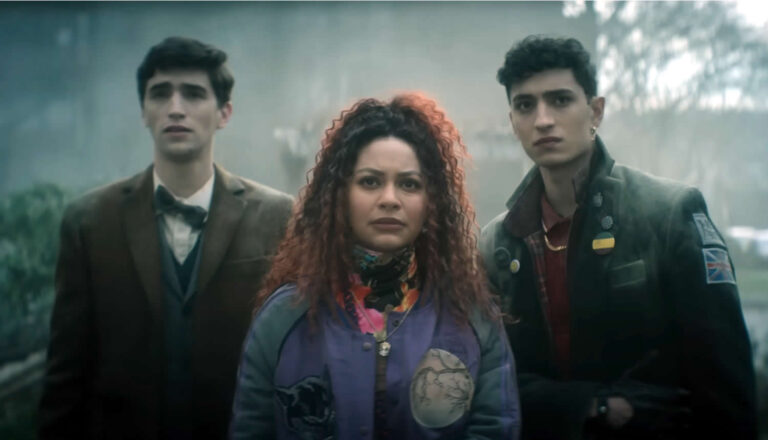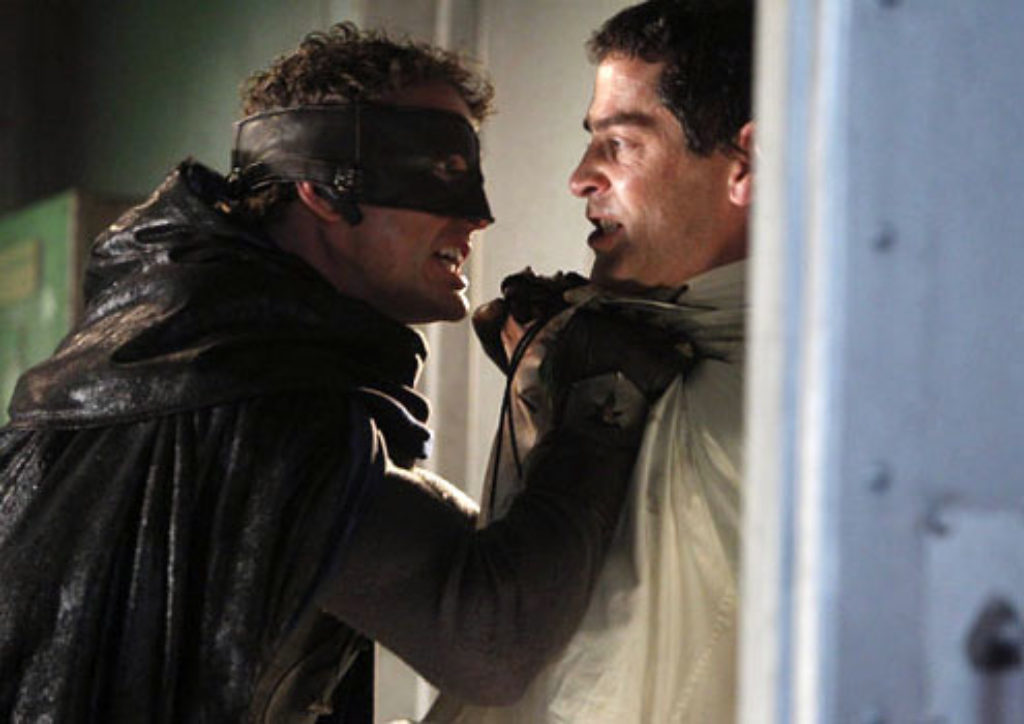
Dead Boy Detectives
Dead Boy Detectives targets teens in style and story. But it comes with very adult, problematic content.

Capes have fallen out of fashion. You rarely see anyone—particularly a man—wearing one these days. Music lovers don’t wear tuxes to the opera anymore, much less satin-lined throws. Vampires now favor T-shirts and jeans over eveningwear. Even new-school superheroes shun the flappy accoutrement.
“No capes!” insists supersuit seamstress Edna in The Incredibles.
Unless, of course, your superhero name happens to be The Cape. Then it’s OK. And let’s face it: Without the cape, The Cape wouldn’t be much of a superhero at all.
Vince Faraday—The Cape’s alter ego—can’t fly or spin webs or even turn green. Accused of a crime he didn’t commit and now presumed to be dead, Faraday is just an ex-cop on a mission: He wants to bring the guy who framed him (lizard-eyed CEO Peter Flemming, who dabbles in supervillainy as the masked Chess) to justice, clear his name and get his family back. But since Flemming literally runs Palm City’s privatized police force, Faraday has to do his crime fighting under cover. He can’t even contact his family to let them know he’s alive for fear it would put them in danger. So he takes on the persona of his son’s favorite comic book hero, hoping to keep the lad’s spirits up—and perhaps even hint that dear old Dad isn’t so guilty (or dead) after all.
The Cape’s cape isn’t magic—not in the mystical sense at least. Illusionist Max Malini and a gang of criminalized circus performers teach Faraday how to make its bulletproof fabric shrink and grow while serving as a parachute and a grappling hook. Orwell, a coquettish computer wizard with a sweet Mercedes serves as his sidekick/IT support.
The Cape, as you’d expect from a show about superheroes, has some nice messages, particularly when it comes to family. Faraday desperately wants his back, and it practically kills him not to be there for Trip, his little boy. He’s not even one episode in before he visits Trip in his superhero guise, telling him, “Don’t ever lose hope. And be good to your mother. And study your math. You need to work on your math.”
When given a chance to escape with his family—to run away with them to a different town—he chucks the opportunity because he feels that running away would be teaching Trip the wrong sort of lesson. Vince wants to show him that one man can make a difference. It’s a lesson that affects not just Faraday’s son, but Max as well.
“You take it from a man who never knew his father and never had a son,” he tells Vince. “That bond, it’s what makes heroes.”
But like Vince’s beloved Palm City, all is not as pretty as it seems. Max, as we mentioned, leads an outfit called the Carnival of Crime. Faraday not only turns a blind eye to their thievish ways, he actually helps them rob a handful of banks early on. He’s under duress at the time, but his relationship with them blossoms and solidifies as a result. The robbers explain they’re stealing from Flemming, but of course that doesn’t make any sense at all. So telling Trip how his crime-fighting Dad became enmeshed with a crime syndicate might be kinda tricky down the road.
Good-guy characters swear, drink, beat the stuffing out of evildoers and (in training) each other. When they’re of the female persuasion they wear some fairly revealing clothes. Would Vince’s still loving, committed wife appreciate the fact that her incommunicado hubby’s gallivanting around town with a pretty little thing half his age? Removed of its superhero context, the relationship sounds like a story that might show up on a Twitter feed: “Disgraced cop lives! Spends days with coed home wrecker!”
I exaggerate. I’m sure Vince’s wife would understand all the extenuating circumstances and just be happy to see him. And let’s remember, Vince is trying to do the right thing—the heroic thing—within the bounds of his imperfect circumstances.
But is he super? Sorry. Not even Vince’s cape can wipe away his, his friends’ or this show’s flaws.
“Pilot”
When Palm City’s new police chief is assassinated (in a frightening car explosion), Vince Faraday tries to track down the killer. Instead, Vince is framed and nearly killed, eventually falling into the hands of a troupe of bank-robbing circus performers. They torture and threaten to kill him until he volunteers his help with robbing more banks. Then he instantly becomes a trusted friend. “You give me your soul, Vince Faraday,” troupe leader Max Malini says, “and I’ll make you the greatest circus act in the land.”
We see several fights which leave Vince and others bloody and beaten, and a couple of private security men appear to lose their lives in a huge explosion. A woman is shot in the head (we see the bloody wound) and the police chief is asphyxiated before he’s killed with the car bomb. Vince has a mask stapled to his skull.
A hypnotist proves his expertise by switching Vince’s underpants with lacy panties. (We see Vince pull them up from under his pants.) Vince returns the “favor” by putting a red bra on the hypnotist. Women show midriffs and cleavage. Vince and Dana are shown kissing and lying in bed together. Max drinks wine. Characters say “h‑‑‑,” “d‑‑n” and “b‑‑ch.”
“Tarot”
Max takes away Vince’s cape temporarily, so Vince launches out on his own, setting up his own secret lair. Even without the cape he saves a politician—the only public voice crying out against Flemming—from being poisoned. Vince’s wife, Dana, wonders whether her Faraday surname is a liability in her job search. She decides it’s not.
Cain, the episode’s designated assassin, took his name from the biblical Cain, proudly calling him the “father of all murderers.” He leaves a tarot card at a bar after poisoning its patrons. (We see foam dribble from the mouth of one.) Cain also poisons a bird via injection and The Cape via stab wound. Max sets out to save him by injecting him with another, counteractive poison and says, “It’s in God’s hands now.” Later, Vince drinks a bit of poison himself, perhaps to try to build up immunity.
In flashback we see Vince and Dana kiss. People, including women, are beat up. And they carelessly abuse God’s name and say such things as “h‑‑‑,” “d‑‑n” and “p‑‑‑.”


Paul Asay has been part of the Plugged In staff since 2007, watching and reviewing roughly 15 quintillion movies and television shows. He’s written for a number of other publications, too, including Time, The Washington Post and Christianity Today. The author of several books, Paul loves to find spirituality in unexpected places, including popular entertainment, and he loves all things superhero. His vices include James Bond films, Mountain Dew and terrible B-grade movies. He’s married, has two children and a neurotic dog, runs marathons on occasion and hopes to someday own his own tuxedo. Feel free to follow him on Twitter @AsayPaul.

Dead Boy Detectives targets teens in style and story. But it comes with very adult, problematic content.

An elf mage contemplates on connection and regret as she watches her human friends grow old and pass away.